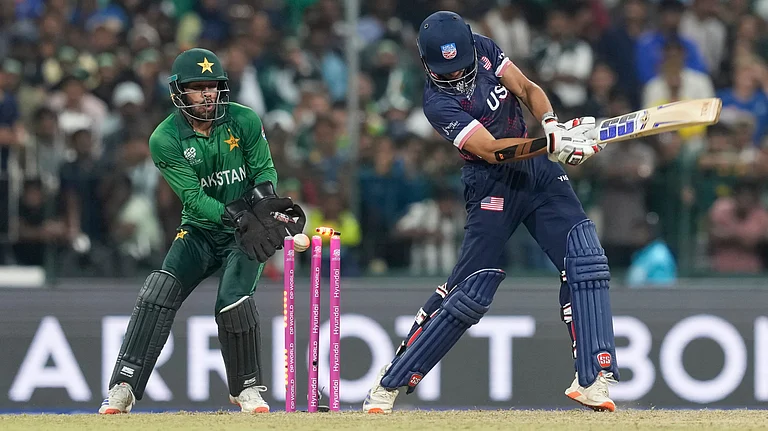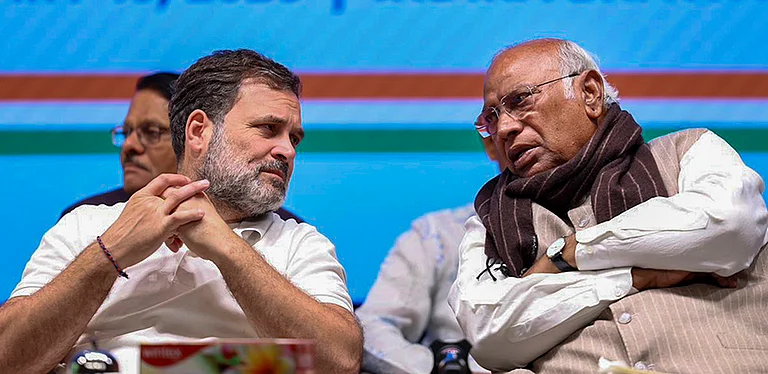Like the plot of Pipli (Live), occasionally a story becomes so big that everyone descends upon it. The irony is, ever since Pipli’s director Mahmood Farooqui was held for raping an American scholar, there has been a great deal of debate on the nature of his assault and, after the verdict, on the quantum of punishment.
Feminists and legal luminaries have weighed in, and while all agree that anyone accused of rape needs to be punished, how the law defines and punishes the crime is being contested. Further, the debate has split the women’s movement on other aspects of criminal law, as amended in 2013.
To be sure, Farooqui isn’t the first well-placed man charged with rape and at the centre of a controversy. When Tarun Tejpal, founder-editor of Tehelka, faced similar charges, a polarising disputation erupted over whether what he did was ‘rape’. “Indeed, feminists are debating these issues, but the women’s movement always had spirited discussions. It’s a very healthy trend,” says feminist writer Urvashi Butalia.

Interview with Flavia Agnes, Outlook, September 5
That said, participants are cautious. Critics fear being misunderstood and painted anti-woman. Those who spearheaded the anti-rape law reform in 2013 worry about ‘red herrings’ and dilution of rights.
“Critique of the judgement has been misread by some as a call for trivialising forced oral sex as a minor indiscretion, or a misogynist reversal of battles hard won. Why it should be so is puzzling. Have we not critiqued judgements earlier,” asks Manisha Sethi, who teaches at Jamia Millia Islamia.
Farooqui’s crime was proven in trial. His punishment is seven years, the minimum; the road to appeal is open. The controversy is over what he did—forced oral penetration. A researcher visited his house, and, when they were alone, he forcibly performed oral sex upon her. The offence fell within the wider definition of rape under Section 375 of the IPC in 2013. Whereas earlier, it would have attracted modest punishment for ‘outraging modesty’, it is now on the same footing as forced penile penetration—both now deemed as ‘rape’.
The backdrop of the amendments was the brutal gangrape of a physiotherapist in Delhi and public uproar over ‘weak’ anti-rape laws. The law is now unambiguous on consent and a woman’s right to her body. Plus, penalties are harsher. Nevertheless, feminist activist and lawyer Flavia Agnes has said in a recent interview to Outlook that even the new law has problems.
“The criminal law amendments of 2013 were not thought through enough. Compared to other jurisdictions like the UK, where the Sexual Offences Act 2003 offers a gradation of offences in sections 1-4, section 375 of the IPC encompasses all offences under the single category of rape. Other provisions, for instance on reversal of burden of proof, are again quite broad,” says Prabha Kotiswaran, reader in law and social justice at King’s College, London. “This will keep sparking heated debates, especially in high profile cases.”
When UK redrafted criminal laws, it categorised the crime Farooqui was convicted for as a sexual assault, not rape. Says Kotiswaran, “For, in the public mind, rape is associated with forced penile penetration, not penetration with the mouth.”
In India, rape as forced penile penetration doddered in the courts, securing convictions in a fourth of cases. If the new definition is questioned, activists fear reverting to that old patriarchal norm. The broader definition, however, causes other forms of consternation: “One element of due process is to define a criminal act in narrowest possible terms, then interpret it strictly, not widely. But the 2013 amendments do the opposite—rape is given the broadest possible definition. Due to high incidence of rape, I may reluctantly agree. But in terms of punishment, you must bring in gradation and rules of proportionality. Not doing so may lead to harsh sentences,” says Faizan Mustafa, V-C, NALSAR University of Law, Hyderabad.

Outlook’s September 12 story on the trauma of male rape victims
This conflict over gradation lies at the heart of the debate. “Whether punishment for oral sexual assault is the same as forced peno-vaginal penetration depends on if it causes the same harm,” says Jhuma Sen, professor at Jindal Global Law School. The seven year punishment for rape existed before 2013; but judges would lower the punishment, often on irrelevant considerations. “To call rape by non-peno-vaginal penetration more benign puts vaginal rape at the centre. This is unacceptable,” she says.
Senior advocate Indira Jaising points out that even attempt to resist forced oral rape can be disastrous for victims, leading to possible death from asphyxiation.
“I find it offensive when one rape conviction is picked on to start a debate on legal ‘reform’ that may undo the women’s movement’s work,” says John. She refers to arguments in Farooqui’s trial that forced oral penetration is less traumatic. “Trauma is subjective. To parse every individual’s response is as if victims must feel guilty when the law punishes rapists,” says John.
In 2013 activists, scholars, even the public wanted all non-consensual penetration to be liable as rape, not just penile penetration. This view is being contested too.
“It is true that the patriarchy of the judiciary was on display when rape trials ended in extremely low sentences. However, is that good enough reason to withdraw judicial discretion in favour of a minimum mandatory sentence of seven years is the question,” says Sethi.
This refers to another change, taking away discretion of judges to award lower penalties than the minimum. Sethi’s view supports inclusion of oral and digital rape and acknowledgement of sexual violence during sectarian or communal strife by amendments. But, she feels categories of punishment and grading of sentences need further interrogation as, among other issues, cases of elopements involving underage lovers are often registered as rapes and abduction.
“Here, judicial discretion promised some relief. Now, that possibility is foreclosed. The inevitability of a seven-year sentence in such cases is not fair and just,” says Sethi.
The aim of feminists was not to put girls and boys in consensual sexual relationships behind bars but to give women rights over their bodies. Yet, in the Indian social context, parents of girls are likely to appropriate that right. “One can’t conclude this law is harsh if there’s no discretion. What’s the alternative? On sentencing, we need a policy; we don’t even have one for the death penalty,” says Sen. Further, in 2013, age of consent went from 16 to 18, so a larger number of cases of consensual sex face likely punishment. Removing judges’ discretion on sentencing was not on activists’ ageNDA in 2013; they oppose increasing the age of consent. These were legislative calls.
“Feminists must accept that there will likely be casualties of the 2013 amendments. The question is, can we justify the benefits, for we will put away a lot of people. The problem arises as there was not enough nuance when the law was drafted,” says Kotiswaran.
This is a perennial issue: Dowry prevention and domestic violence laws trigger similar concerns. As advocate Mihira Sood says, feminists and others are still adjusting to the new anti-rape laws. The first few cases involving famous personalities provide occasions for them. But it’s impossible not to wonder if, had Mahmood and Tejpal been just anonymous males, these debates would still be raging.


























